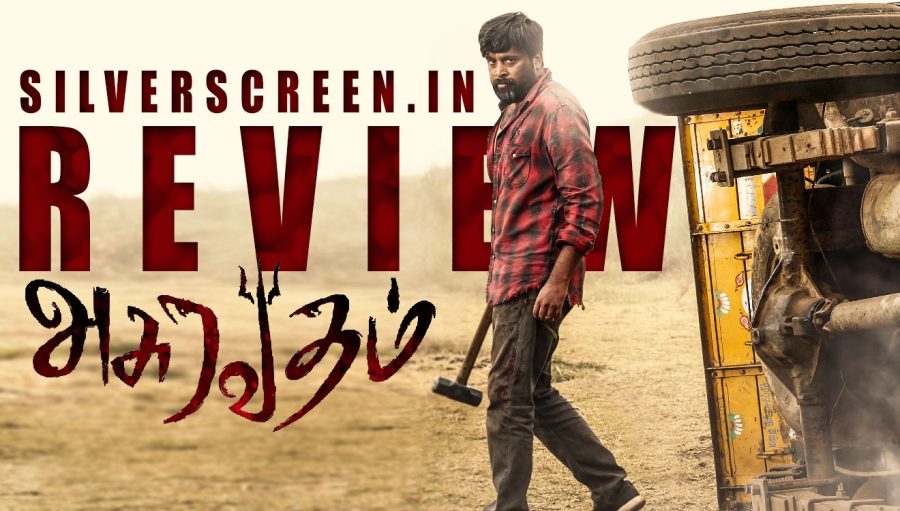Cast: M Sasikumar, Nandita Swetha, Vasumitra
Director: Maruthupandian
Asuravadham opens with a disgruntled man, Samayan, being told off by his father-in-law, over a phone call, for treating his wife badly. He asks to speak to his wife who has gone back to her parents’. She refuses, and the father-in-law tells Samayan she’ll be back in two days and he better look after her well and see that this is not repeated. A scene that does not prepare the audience for what is about to unfold. Good.
Following this, Samayan (Vasumitra, a relative newcomer) hangs up and goes in to get changed after putting his phone on charge and sees a couple of missed calls. He tries to answer the phone the third time but the caller hangs up just as he answers. A few more calls follow in the same pattern. This cat and mouse game is, in fact, a sort of metaphor for the rest of the film, until the final call when the caller speaks. A threatening voice tells a now-distressed and angry Samayan that he needs to bring his wife back. And that in a week Samayan will be dead. The conversation, by referring to Samayan’s actions at that very moment, implies that the caller is watching his target.
And so it begins. In the tradition of revenge thrillers, Asuravadham, director Maruthupandian’s second film, does a great job of packing most of the action in the first half. The unnamed character, played by M Sasikumar, keeps his mystifying pursuit of Samayan up and all a cowardly Samayan, who has thuggish people for friends, can do is keep asking this inscrutable hunter who he is and what he wants. About 15 minutes in, you see who the caller is but don’t know his name or identity. All we see is him chasing Samayan, a grocery shop owner, an almost-guilty, middle-aged man trying to stay alive or kill his hunter first. Set in what seems to be Dindigul (later in the movie, a police road barrier gives you this detail), Asuravadham hints at Samayan being a sort of brutish philanderer while loudly declaring M Sasikumar’s character a silent, unflappable vigilante.
It would ideally take a second viewing for a review to do justice to Asuravadham. Having grown up on obvious, brash revenge films, the subtlety of the plot and the devices used to tell the story come as a surprise. This is not to say the film is subtle in any manner; on the one hand, Vasumitra’s Samayan is loud and almost animal-like in his rage and pain, but also one can tell he hasn’t quite attained the level of finesse where he becomes the character himself. Sasikumar, on the other hand, plays a role much suited to his limited emotive capabilities – all he has to do through the film, at least till the end, is play an intense, quietly vengeful man with a single focus: that of killing Samayan. Other things that display the absence of subtlety is the horde of thugs that Samayan gathers in seeking help, and the very loud music towards which one could have mixed feelings. Thaikkudam Bridge Govind Menon’s music sets the tone for a thriller or a horror movie right at the beginning, and the sound design and camera work only add to everything that causes you to breathe lightly in anticipation, almost on the edge of your seat.
Like the Collin Farrel-Kiefer Sutherland starrer Phone Booth, Asuravadham unravels the reason for revenge rather smoothly, as the film progresses (and not altogether at once) although it feels like the first half and the cat-and-mouse chase extends a little past tipping point. Post-intermission, however, the treatment tightens dramatically and you forget that you spent most of the first half asking yourself, “Just who is this guy and what does he want,” in your own rendition of Samayan. The visual tone and the use of light in the movie are excellent: be it the lightning in the middle of the night, a quiet golden morning light when Samayan and his friend are talking, or the lack of a sunny day right till the very end when, symbolically enough, it rains. SR Kathir’s cinematography is a real treat, with the camera work so tight, so intense and yet capable of giving you a sense of things being vast that it seems futile for Samayan to try and run away from his hunter. Where will he go? Where will he hide?
The climax of the movie involves a fairly elaborate flashback that tells you why you’re watching this movie. The denouement, one with plot twists coming so quickly, and yet so very naturally, leaves the viewer at once stunned and angry. Strangely enough, while the climax leaves you in more than a bit of shock, the director fails to evoke sympathy for the protagonist, and that could largely be attributed to the very overwhelming background score and the extended agonising over why Sasikumar’s character is bent on killing Samayan. The depiction of, and hinting at, women being a source of a man’s pride probably rests uneasy on many a woman’s mind but then this is small-town Tamil Nadu and bringing “evolved urban” feminism to view it with might not be the best way to treat this movie. It might have its place in, perhaps, an analysis.
The extended cast is full of fairly effective performers but Nandita Swetha, who plays the protagonist’s wife, seems out of place with her sophisticated makeup and highlights, and has very little to do apart from being a placeholder.
Recommended
One could, in fact, call this a psychological thriller as well, instead of a plain old revenge tale, and the script does a wonderful job of understanding exactly how crime happens, how a perpetrator of unspeakable violence, but one who is not seemingly diabolical or abnormal, behaves. In fact, it portrays beautifully the monster in our midst, eating with us, selling us what we need, and insidiously, quietly indulging his evil. Recommendation? Watch it.
***********************
The Asuravadham review is a Silverscreen original article. It was not paid for or commissioned by anyone associated with the movie.



